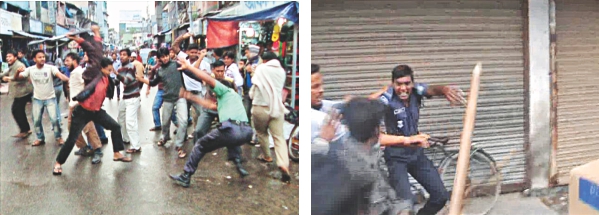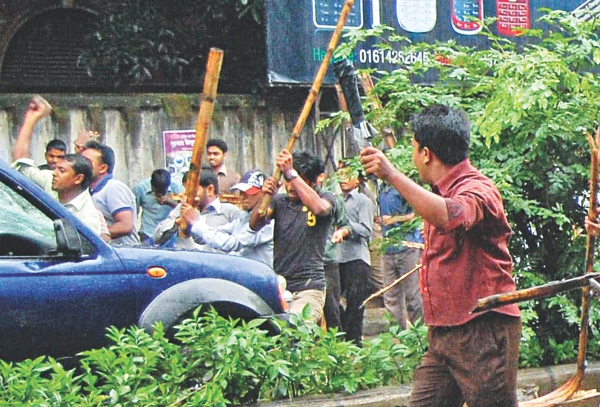| Home - Back Issues - The Team - Contact Us |
 |
| Volume 11 |Issue 47| November 30, 2012 | |
|
|
Periscope Devil's Double AHMEDE HUSSAIN
In the last few weeks Jamaat-e-Islami (JI) and its student wing have launched a string of barbaric attacks on on-duty policemen in the streets of the capital and other major cities across the country. Members of Jamaat and Shibir have hit the police with brick-bats; some have even tried to set police officers on fire. The party's aim however is less than obvious–the release of some of its leaders who are facing charges of war crimes during Bangladesh's Liberation War. Intelligence reports suggest that the assaults are a long drawn out plan to create unrest in the country in the run up to the verdict of the ongoing War Crimes Trial, which might be handed down in the middle of next month. According to the JI members grilled by the police, the party has sent its cadres to different parts of the country to that effect. There are ample reasons to ban Jamaat and its student organisation right away–the very basis on which Jamaat stands is wrong–it opposed Bangladesh's independence, set up several paramilitary groups that seconded the occupation Pakistan Army in rape and mass murder. Throughout its existence in independent Bangladesh the JI has never apologised for these heinous acts. The JI, which was banned immediately after the country's independence, was allowed to regroup during Gen Zia's rule, since then it has targeted different educational intuitions of the country to spread its tentacles. The party became a formidable force because of the ruthlessness with which it deals with any opposition to its politics. During the eighties and throughout the nineties, Shibir cadres slashed tendons of the hands and feet of fellow students who opposed the party. Shibir's favourite were members of the Communist Party and the then Bakshal-backed Jatya Chhatra League. In an infamous example, during the eighties, Tobarak Hossain, a member of Students Union was slaughtered by a sword in his dormitory in Chittagong College by a Shibir member.
Banning the JI now, however, is not the solution. The party, as a political entity, should face trial for participating in crimes against humanity, and following the trial's verdict, the party should be banned. The JI, on the other hand, has to go through an overhaul; it must disband the party, apologise for the crimes its members had committed during the Liberation War, disown the leaders who had committed war crimes and make room for a young leadership in a new, changed party with a new name and a forward-looking outlook. The present leaders of the JI must know that no matter how many police officers their party men assault or the number of cars and buses they set fire to, their past will not be erased from the heart of ordinary Bangladeshis. Those who do not believe in Bangladesh must not be allowed to live in Bangladesh, let alone do politics in the country. The JI has grown into a monster thanks to the tacit and overt approval of both the major political parties. The Bangladesh Nationalist Party (BNP) is the biggest culprit of the two. The party is in an alliance with the JI, and in the BNP's last term in office two war criminals belonging to the JI were given important portfolios in Khaleda Zia's cabinet. It is time the BNP leadership realises that the JI is a burden rather than a tower of strength for the party. The presence of the JI in the BNP-led alliance is a big stumbling block for those who are disenchanted by the ruling AL government and are looking for an alternative, as they cannot vote for the BNP because of its hobnobbing with war criminals. Not only that, if the JI is banned or the party is disqualified from participating in the general elections, the majority five percent votes that the JI get from the extreme rightist elements of the society will undoubtedly be cast in favour of the BNP. The Awami League (AL) government should pursue the war crimes trial more vigorously. New trials need to be started and new war crime suspects must be brought to the book, and it must be done in a free and transparent manner so that the war criminals do not get off the hook through legal loopholes should the AL loses the general elections in 2012. The police will have to give a free hand in dealing with marauding JI members who are bent on creating anarchy in the country. It is hoped that some ministers' comments that the AL, along with the ordinary people, will resist the JI and Shibir is merely a political claptrap. If the party leadership has something like this in mind, it should resist the temptation, for the law enforcing agencies are enough to handle the JI. In democracy, the government does not urge people to fight thugs; on the contrary, it equips the law enforcers in a particular fashion so that the masses are saved from the clutches of criminals. Bringing in party cadres to "resist" the JI will not bode well for the country as it might give birth to anarchy and lawlessness, which the JI might want the government to draw into. The fight against the JI must be fought on every front. Even though the party claims itself to be a political party dedicated to the establishment of an Islamic welfare state, every big political move the JI has made in its history goes against the basic tenets of Islam. History tells us that Jamaat's actions are not mere aberrations, but the rule itself. Imams of different mosques can be made aware of the JI's barbaric activities, and war crimes can also be included in Friday sermons. On top of it all there must be a political consensus regarding the future of Jamaat-e-Islami and the war crimes trial. The government should reach out to the BNP, the biggest backer of the JI, to take it on board. The JI is a cancer; it needs to be removed quickly. One hopes that it is already not too late.
|
Copyright
(R) thedailystar.net 2012 |

